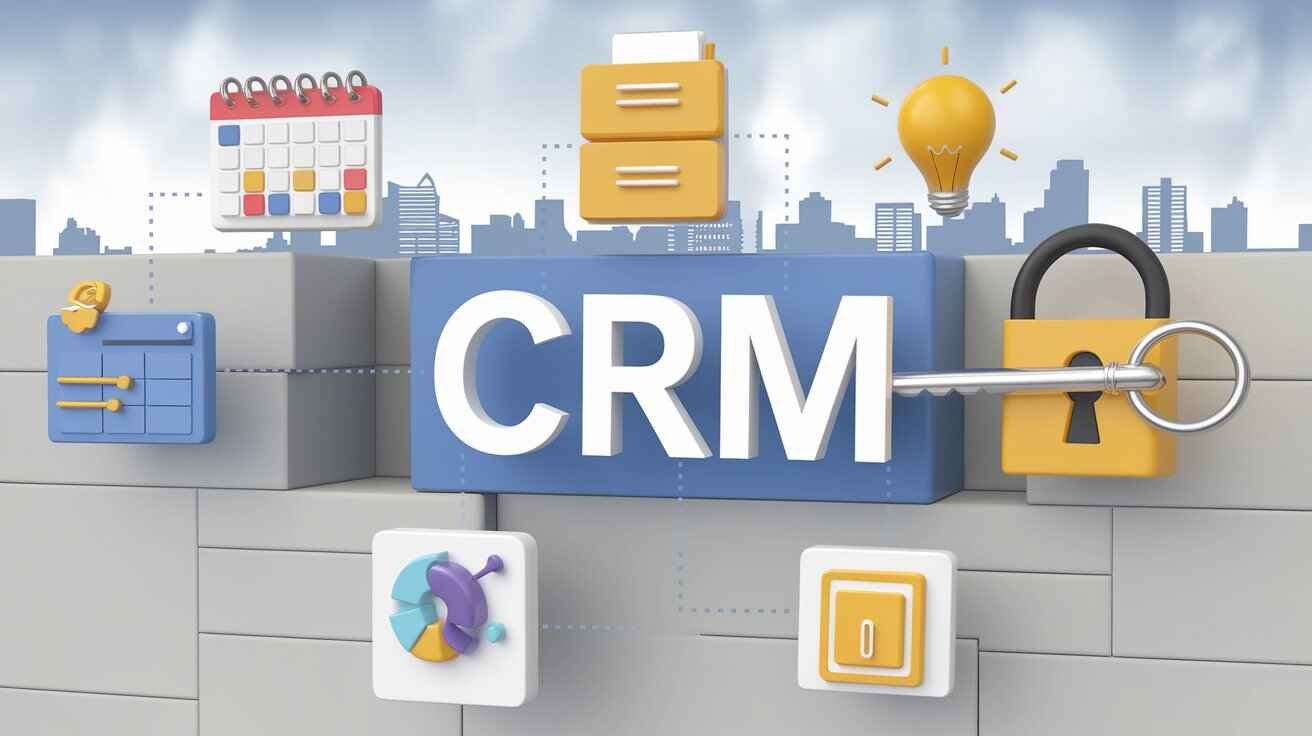In an exceptionally aggressive enterprise world, the Customer Relationship Management (CRM) software program has become one of the most valuable tools for corporations of all sizes. Whether walking a small enterprise or coping with a large enterprise, CRM software allows you to prepare purchaser information, automate sales and advertising methods, and beautify verbal exchanges with clients. It permits corporations to build more potent relationships with their customers, which results in higher sales and advanced customer retention.
This article provides a complete and in-depth guide to CRM software—from how it works to its types, features, advantages, and best practices. If you’re seeking a CRM solution or need to understand its effect on enterprise success, this guide will walk you through every critical issue, ensuring the content is fresh, precise, and beneficial.
What is CRM Software?
The CRM software program is designed to help businesses control patron relationships, interactions, and information. It permits corporations to shop, arrange, and get admission to patron info like touch information, purchase records, and communication information. This makes it less complicated to provide personalized services, comply with leads, and effectively manipulate sales and advertising efforts.
A CRM device goes beyond basic records management—it presents automation for sales, customer service, and advertising obligations, improving productivity across the corporation. With the entirety saved in a single region, teams can collaborate more effectively, track interactions in real-time, and ensure no consumer is left unattended.
How CRM Software Works
The number one reason for a CRM gadget is to accumulate, save, and manage data associated with clients and potentialities. Here’s how it works:
- Collecting Data from Multiple Channels: CRMs collect information from assets, websites, emails, smartphone calls, stay chats, social media systems, and in-shop interactions.
- Creating Centralized Customer Profiles: The device stores all consumer records, including touch info, purchase history, verbal exchange preferences, and remarks, in one area, giving an entire view of every client.
- Tracking Customer Interactions in Real-Time: The gadget logs every customer interaction with the business—whether through email, phone, or chat. This allows teams to reveal the patron journey from initial touch to final buy.
- Automation of Tasks: Routine activities like sending emails, scheduling follow-ups, or assigning leads are computerized, decreasing guide work and mistakes.
- Generating Reports and Insights: CRM software analyzes the amassed facts to generate reports on income tendencies, lead overall performance, and purchaser pride. These insights assist groups in making knowledgeable, information-driven choices.
- Integration with Other Tools: Many CRM systems integrate with accounting software programs, advertising structures, and electronic mail services, allowing seamless information sharing across departments.
Key Features of CRM Software
- Contact Management: Store and manage patron contact information and categorize them primarily based on leads, present customers, or ability potentialities.
- Sales Pipeline Management: Track leads as they develop through specific income levels and ensure the possibility is misplaced.
- Marketing Automation: Automate email campaigns, newsletters, and social media posts to enhance advertising efficiency.
- Customer Support Tools: Managed and replied to purchaser inquiries and aid tickets to provide higher services.
- Reporting and Analytics: Get targeted insights into sales traits, consumer behavior, and overall marketing campaign performance to optimize commercial enterprise techniques.
- Mobile Access:Access the CRM system on the mobile apps, allowing groups to work remotely without disruptions.
For more insights into the Latest Tech Trends and Gaming updates, visit our TimesFlicker.
Types of CRM Systems
- Operational CRM: Focuses on automating and streamlining daily sales, advertising, and customer service operations.
- Analytical CRM: Provides insights through data evaluation and reporting tools to help groups comprehend customer conduct and expect unexpected trends.
- Collaborative CRM: Promotes communique between extraordinary departments to ensure clean statistics sharing and beautify teamwork.
- Strategic CRM: It helps corporations focus on long-term consumer engagement techniques by presenting equipment for dating management and loyalty packages.

Benefits of CRM Software
- Improved Customer Relationships: With access to complete consumer profiles, companies can provide personalized offerings, enhancing customer satisfaction.
- Increased Productivity through Automation: Automating habitual duties frees up time for personnel to focus on high-cost sports, such as nurturing leads and closing deals.
- Enhanced Sales Performance: CRM structures help song income pipelines correctly, ensuring no lead or possibility is overlooked.
- Better Team Collaboration: With centralized records, income, advertising and marketing, and customer service groups can collaborate without problems and avoid duplicating efforts.
- Accurate Forecasting and Reporting: Detailed analytics and reviews allow corporations to expect destiny trends and make data-pushed choices.
Industries that Use CRM Systems
- E-trade: Track online purchases and patron options for personalized gives.
- Healthcare: Manage affected person information and appointment schedules to enhance career.
- Real Estate: Monitor property listings and client communique correctly.
- Finance: Provide personalized investment recommendations and control portfolios quickly.
How to Choose the Right CRM for Your Business
- Identify Business Needs: Determine the functions your business desires, which include sales automation or reporting gear.
- Check for Customization Options: Make sure the CRM can be tailored to suit your unique workflows.
- Look for Integration Capabilities: Choose a CRM that integrates with the tools your commercial enterprise already uses.
- Consider Scalability: Select a CRM that could grow together with your commercial enterprise because it expands.
Common Challenges with CRM Adoption
- High Initial Costs: Some CRM structures require giant upfront investments.
- Complex Implementation: Adopting a CRM system may involve training personnel and converting workflows.
- User Resistance: Employees can be hesitant to replace a brand-new machine. Proper schooling and support are essential to ensure smooth adoption.
Top CRM Software Solutions in the Market
- Salesforce: Known for its advanced functions and scalability.
- HubSpot CRM: Popular for its person-friendly interface and loose plan.
- Zoho CRM: Offers inexpensive pricing and customization alternatives.
- Pipedrive: Focuses on income pipeline control.
- Microsoft Dynamics 365: Combines CRM and ERP competencies.
Best Practices for Implementing CRM Software
- Train Your Team Properly: Ensure all employees are comfortable using the new machine.
- Start with a Pilot Phase: Test the device with a small crew before rolling it out company-wide.
- Set Clear Goals and KPIs: Define success metrics to determine the effectiveness of the CRM.
- Keep Data Clean and Updated: Regularly update purchaser data to ensure accuracy.
Future Trends in CRM Software
- AI-Powered Automation: Future CRMs will use AI to offer higher predictions and personalized hints.
- Voice-Activated CRM Tools: Voice instructions are more significant for dealing with consumer interactions.
- Increased Mobile CRM Usage: Mobile apps will play a more vast role in CRM adoption.
FAQs
Q: What is the primary intention of CRM software?
A: The foremost purpose is to improve consumer relationships by correctly dealing with interactions, facts, and procedures.
Q: Can small organizations gain from CRM software programs?
A: Yes, CRM software programs help small organizations organize patron statistics and grow sales.
Q: How does a CRM software program enhance client retention?
A: CRM software program enables groups to sing consumer alternatives, interactions, and feedback, helping them offer personalized offerings. This improves consumer delight, which inspires lengthy-term loyalty and retention.
Q: What is the difference between cloud-primarily based and on-premise CRM?
A: Cloud-based CRM is hosted on external servers, accessible from anywhere with an internet connection, while on-premise CRM is hosted on local servers. Cloud-primarily based solutions are easier to scale and update, whereas on-premise gives extra control over records.
Q: How long does it take to put a CRM machine in force?
A: The implementation time varies depending on the corporation’s scale and the CRM’s complexity. Generally, it can take several weeks to numerous months to thoroughly combine, customize, and educate personnel on the new system.
Also Read: NVIDIA L4 vs. Titan RTX: Power Play for AI and Gaming





